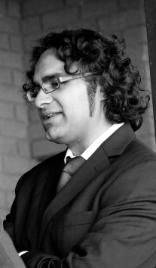Considering the 'psychological railway' got Anjum on track for major award
Published on 24 July, 2012
Trains carry precious cargo, either human or freight. They are heavy, expensive and travel at high speeds, meaning accidents or even incidents can have huge ramifications.
That's why CQUniversity researcher* Dr Anjum Naweed has been focusing on role of the train driver in making complex and potentially vital decisions along every few metres of track.
He's been travelling with drivers, interviewing drivers and trying to get inside their thought processes to compare their 'psychological railway' with the actual railway.
Dr Naweed has so far conducted research with with train drivers at RailCorp, Adelaide Metro, V/Line, PTA (WA), and QR National, in his role with the CRC for Rail Innovation, where he heads up the Route Knowledge Acquisition and Capturing Driver Strategies projects.
He says the initial data indicates train drivers are mentally organising their routes in a manner far more sophisticated that originally conceived.
"It's interesting that perceptions of route difficulty appear to interact with perceptions of enjoyment," he says.
Dr Naweed says the research data will eventually help to optimise the train driver learning process, including the effective use of simulators.
"We are investigating how train drivers ‘picture' the railway in their heads, and how this mental picture helps them apply certain driving techniques," he said.
"Once we've got a good idea of the way that route knowledge is mentally processed, and how this interacts with navigational strategies, we will be able to translate this to the simulator and start investigating scenarios that enhance learning and optimise competencies, while harmonising best practices across the industry."
Dr Naweed's paper, entitled: "That Train Has Already Left the Station! Improving the Fidelity of a Freight Locomotive Simulator at Post-Deployment", recently received the Body of Knowledge Award at Australasia's premier simulation conference, SimTect, held in Adelaide during June.
The CQUniversity academic notes that SimTect has traditionally been a defence conference, hence "this award is a big deal for Australia's rail industry at large as it indicates that our industry is starting to hold its ground amongst other industries in the area of simulation research".
A train simulator that Dr Naweed has been evaluating will soon be moved to CQUniversity's Appleton Institute in Adelaide, where he is a Senior Postdoctoral Research Fellow.
"We are examining how realistically the simulator operates to make drivers think that they were driving an actual train, and feeling the presence of the real railway," he says.
"If we want train drivers to accept train simulation as a viable learning tool, we need to be sure the simulator is up to the job!"
Dr Naweed's award-winning paper will be presented at the Simulation Interoperability Standards Organisation (SISO) conference next year in the USA, providing a great opportunity to showcase Australian rail research on a world stage.


